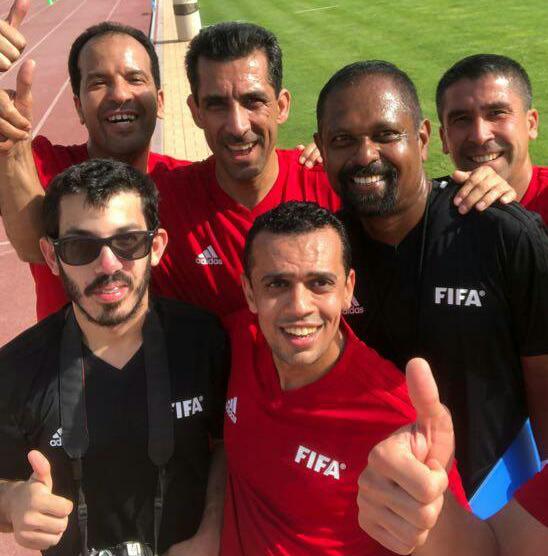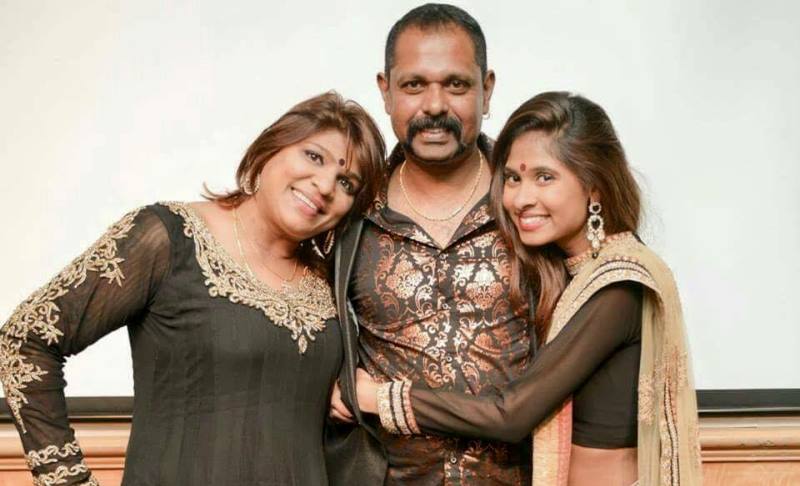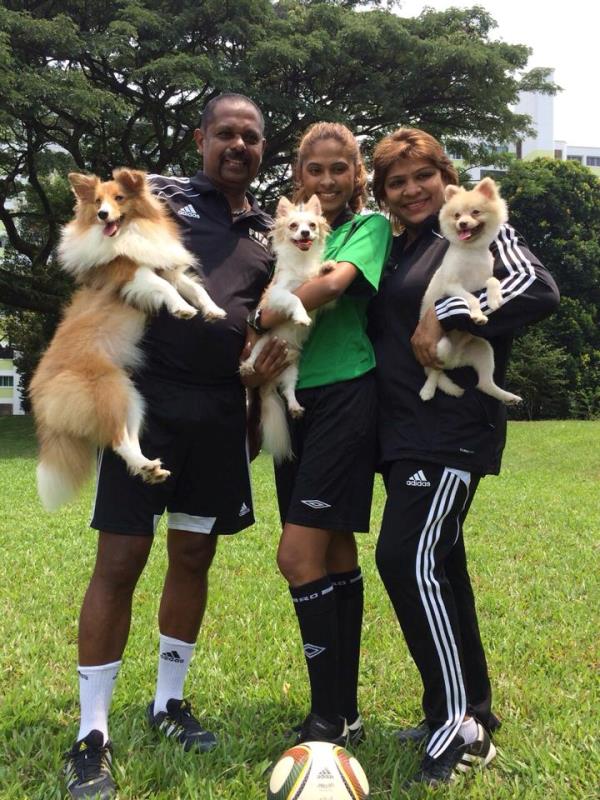
SINGAPOREAN Ganesan Maniam holds his head high as ASEAN’s first FIFA fitness instructor to train the world’s best football referees at this month’s World Cup Finals in Russia.
It’s a “dream come true” and the realisation of a childhood aspiration ever since he took to the whistle in 1985 as a junior referee with the FAS (Football Association of Singapore).
He recollects: “I stopped playing league football with NFL (National Football League) club Ang Mo Kio at 30 (1995) as I had too many injuries and decided to concentrate on refereeing. I got fast-tracked to be promoted as a FIFA Assistant Referee at 31 years and even did the FIFA Under-17 Finals in 1997 in Malaysia.”
He later switched to be a FIFA referee for a “more challenging role” but gave it up as he couldn’t cope with the “tough physical demands because of my string of past serious injuries with hamstring, torn meniscus, collar bone broken fracture and even a shoulder dislocation”.
This inspired him to learn more about football injuries and he even ventured to quit his job at the United World College’s physical education department to join FIFA as a professional fitness instructor.
Now Ganesan is proud he follows the global footsteps of the late George Suppiah, who was the first Asean referee to hold the whistle at the 1974 World Cup in the-then West Germany. Since then, Singapore referee Shamsul Maidin (2006 in Germany) and assistant referees K. Visvanathan (2002 in South Korea/Japan) and Jeffrey Goh (2010 in South Africa) have made the grade at the highest global football event.
“It’s definitely a major dream come true,” says the 53-year-old Ganesan, who rose up the FIFA ranks to be a fitness instructor and now the first in Asean to make it to Russia 2018. He also did the FIFA Under-17 World Cup Finals in India last October.

‘DREAM THE IMPOSSIBLE’
He hopes that his World Cup feat will inspire more Singapore and Malaysian referees to “dream the impossible and to make it to the highest global world stage”.
“Remember there are no short-cuts to success,” he says. “They have to be at the top of their fitness level as well as to perfectly grasp the Laws of the Game. They must be spot on during game play situations.
“A referee needs to position perfectly to identify the fouls correctly and sanctioning them accordingly. They need to show maturity in their job and this only comes when they know the A-B-Cs of the game like the palm of their hand. This only can be achieved by rigorous technical and physical sessions, possibly once in every two months.”
He urged the younger referees to learn the updated teaching videos from FIFA. He explains: “We are also introducing new teaching methods which involve more practical activities around five topics: severity of fouls, tactical fouls, handball, advantage and positioning.
“The physical demands are definitely on the rise. Speed is of the essence and there’s no compromising in being close to play to make the precise decisions. We are here to present up-to-date facts and figures regarding the physical demands of refereeing at top global levels as the number of sprints, for example, have almost doubled – meaning games have become much more demanding.”
At Russia 2018, behind the scenes, Ganesan explained specific elements of the pre-tournament course before the competition starts on June 14. He says: “From a physical-fitness viewpoint, among other things, we do a weighing session, and we also measure body fat percentage. We want to show specific exercises to improve speed and agility, because these are very important. We also show the referees typical exercises for visual concentration.”

COMMON INJURIES
His work also involves helping to prevent the most common injuries which can strike the men-in-black. He says: “They usually suffer two types of injuries – to the hamstrings and Achilles tendon. We are showing the referees the exercises to strengthen hamstrings, while a specific exercise known as eccentric muscle training is useful for the Achilles, because they usually have, with their quick bursts of speed, a problem of impact on the ground.”
Ganesan advises those aspiring to be a world-class referee to “manage performance variables as any other professional athlete”. He explains: “Training, nutrition, rest and recovery need to be controlled by experts and ideally, under the guidance of professionals (physical coach, sports physiotherapist, sports nutritionist, etc.). In order to keep balance, personal and family circumstances need to be considered in the whole training and refereeing planning.”
I ask him if there is a difference between the fitness training for referees and assistant referees (formerly known as linesmen) at the professional level?
He replies: “Absolutely. In brief, referees have higher demands for high intensity exercise, with bouts of intermittent type of exercise and incomplete periods of rest. On the other hand, assistant referees require doing more explosive type of exercise in short distances, and with longer recovery periods. Therefore, training for referees and assistant referees must be ‘position specific’.”
Ganesan doesn’t pull punches when he says that good fitness usually equates to correct referee decisions.
He says: “Good fitness allows optimal or improved distance to match situations. And optimal distance is likely to allow better assessment. From a purely fitness perspective, better fitness will result in delaying the onset of fatigue, which results on a negative effect on decision making skills. Last point, ´good overall fitness´ gives the referee authority and credibility.”
For those who want to be professional referees, his advice: “As far as fitness training, dedicate the same amount of training and (if possible) resources than the players you are refereeing. For example, if you are officiating a league where players train four times a week, you should aim to train four times a week, get specialised strength and athletic training. Moreover, look for help to get quality training for your individual needs.”
I ask him if referees are born or if they can be nurtured to be world-class. Smilingly, he replies: “Like as it is in any other job, I feel a referee is 70 per cent born. It’s simple – either you have the quality or you don’t have the quality. But there is always the remaining 30 per cent where in your career you can improve yourself.”
He recollects that as a FIFA referee, he was “very serious of every match and prepared intensely for every assignment”. He says: “Even for all my knowledge and experience, every match was difficult. I used to pray to the Almighty for help me out. But that isn’t enough.
“You have to prepare yourself for the entire week. It’s important to stay calm and away from stress. One needs to conserve as much energy as possible for the big day and stay focused on the job. However, as human beings we have limitations. Even if you prepare everything, there is always that something which may crop up. It’s like a puzzle.”

PERFECT ROLE-MODELS
At Russia 2018, over four weeks until July 14, Ganesan says referees will be told to rise to the occasion to be the “perfect role-models in order to be the right examples for the new generation of referees”.
“We have to pay attention to the future of the referees and this is why we are here to make sure they’re in the best physical and mental state. As instructors, we must have state-of-the-art knowledge to deliver the best instructions and advice,” he says.
“We must focus on the importance of working towards the creation and upgrade of future referees by setting a value-add example for the new generation of referees. Today we have a great responsibility, we are perceived as technical managers, therefore, this is why we want to surprise others when we teach, train and demonstrate our fitness skills and abilities.”
On a personal note, Ganesan, who turned professional with FIFA in 2011, is excited his only daughter, Dalreena Poonam, at 24 years, is following his foot-steps to be a a rare b breed of woman referee.
Significantly, she possesses beauty and brawn as she was Miss Singapore World 2014 and represented Singapore at the Miss World pageant in London, England.
Ganesan says: “My wife, Sheela, actively encourages her, too, as there’s only a handful of qualified female football referees in Singapore. She has been refereeing since 17 years when she was at St Margaret’s School.”
“But I’ve advised her, as I do with every referee, that this is a vocation with no short-cuts. It’s hard work with utmost dedication and discipline if one wants to reach the top. I believe Dalreena has what it takes to be a FIFA woman referee one day.”
The Maniam family is also fanatic animal lovers, too, and at their apartment in Jurong, they have three dogs, three birds, four hamsters and one chinchilla.
“One room in our Jurong flat is for the pets,” says Ganesan. “Dalreena used to ask me to take her to pet shops, where she would sometimes spend hours playing with the animals. Most Sundays, when she was 10 to 12 years, we covered most of the pet shops in Singapore.”
In Ganesan’s refereeing books, punctuality and discipline are the most important principles in life.
His iconic refereeing role-models are Turkey’s Cuneyt Cakir, a 41-year-old insurance agent, who has been in the middle for more than 250 matches including 12 global derbies (five times the fiery Fenerbahce SK vs Galatasaray SK matches) and Singapore’s “Mr Referee” Shamsul Maidin.
Shamsul, 52, is easily Singapore’s best world-class football ambassador and currently the AFC Director of Referee, based in Kuala Lumpur. Since January 2017, he was elected to the FIFA Referees Committee. Additionally, he is the first Asian to be a member of the IFAB Technical Advisory Panel (the world’s highest refereeing decision-making board).
And probably Ganesan’s most serious message to the referees at Russia 2018 will be: “A referee who is fit is one step closer to becoming a competent referee while those who are not fit are doing the game an injustice.”
Masterly preached by South-east Asia’s first and only FIFA fitness instructor, who will silently work behind-the-scenes over four weeks to get the best out of the men-in-black. – By SURESH NAIR
- Suresh Nair is a Singapore-based journalist who was a former FAS Class One referee and a qualified AFC (Asian Football Confederation) Referee Instructor. He also holds an AFC coaching licence, too, and in the S-League, he has done duties as Match Commissioner and Referee Assessor.


































